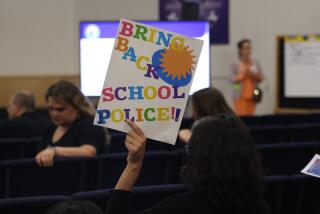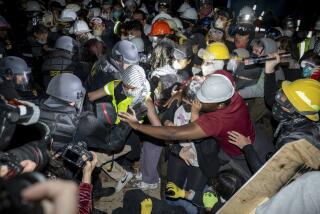University Police Want to Be Armed
- Share via
IOWA CITY, Iowa — Professors go to class with briefcase and books. The football coach would be lost without a whistle. Then why must officers at Iowa’s three state universities go to work without guns?
Public safety officials at the University of Iowa, Iowa State University and the University of Northern Iowa say their officers sometimes feel overmatched, making traffic stops and arrests armed with just a nightstick and pepper spray.
“Being an armed agency would provide another level of service for the people we serve,” insists Loras Jaeger, director of the Department of Public Safety at Iowa State.
“Those officers could be thrust into a situation in which they are inappropriately equipped, and that’s wrong,” says John King, president of the International Assn. of Campus Law Enforcement Administrators. He is director of public safety at Tufts University, whose 40 officers are armed.
The association, King says, has about 1,400 members at about 950 schools nationwide--about half with armed public safety officers.
Jaeger notes that Iowa State officers are able, and certified. They attend the Iowa Law Enforcement Academy and receive the same training--weapons included--as police officers.
Nearly all are highly educated. Iowa State boasts a lawyer, a clinical psychologist and an aerospace engineer among its 34 public safety officers. “I don’t believe competence is an issue,” Jaeger says.
But university presidents and the Iowa Board of Regents, which oversees the state schools, balk at arming officers on campus.
“The campus is, in fact, enhanced by not having security officers armed,” says Iowa State President Martin Jischke. “It has an effect on the atmosphere of the campus and the relationship of those security officers to students.”
Ann Rhodes, vice president of university relations at the University of Iowa, says armed officers might be too tempted. “There’s concern that if people have guns or firearms, they would move to use those firearms fairly quickly without trying to use alternative ways of handling problems,” she says.
Regents have felt the same way for years, approving in 1969 a no-firearm policy unless authorized by the president “in assignments of extreme danger.”
And “that has never been done to my knowledge,” says Frank Stork, executive secretary to the regents.
Although the issue surfaces once or twice a year, Stork says the board has never had to cast a vote in the past decade.
Not even in 1991 when graduate student Gang Lu fatally shot five people on campus and wounded a sixth before killing himself.
“We have the local municipal police in all three cities that can be there within a minute’s notice and can handle situations. We rely on them to do that,” says Owne Newlin, president of the Board of Regents. “I’m in concurrence with our current policy.”
Security officials, however, say today’s world is more dangerous than ever. Earlier this year, unarmed officers at Iowa encountered a student running from an apartment in a building owned by the university.
He told police of a roommate armed with shotgun, assault rifle, semiautomatic pistol and a couple of knives. “He apparently wanted to kill himself by ‘suicide-by-cop,’ ” recalls Chuck Green, safety director there.
Iowa City police handled the call.
“You can have a myriad of near-misses like that,” says Green. “One of those times, one of these officers is going to get unnecessarily harmed or, because we’re not fully equipped, we won’t be able to aid one of our constituents.”
Nick Arnold, student body president at Northern Iowa, sees no reason why security officers should not be armed.
“If we’re going to be introducing guns into a situation anyway with police officers, then why not arm our security officers?” he says. “They can respond quicker than police and hopefully stop it.”
The student senate at Northern Iowa went on record last fall, voting 31-5-1 to ask the regents to change the policy.
“It really came down to the safety of the students,” Arnold says. “It’s not what we know would happen, it’s what we don’t know is going to happen.”
More to Read
Sign up for Essential California
The most important California stories and recommendations in your inbox every morning.
You may occasionally receive promotional content from the Los Angeles Times.













